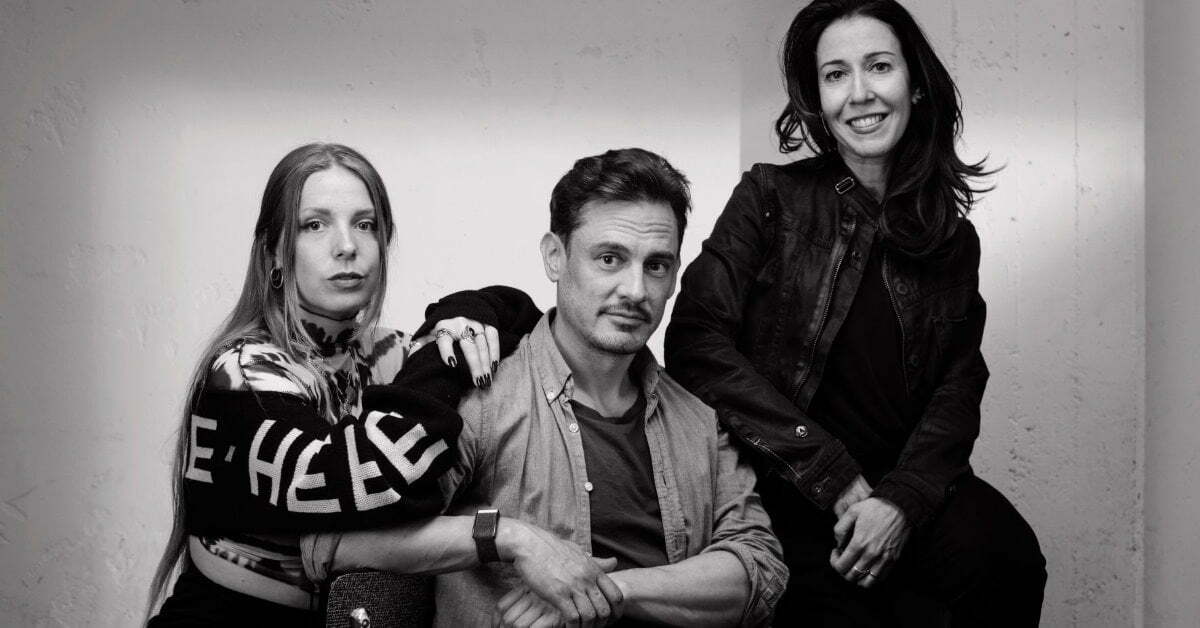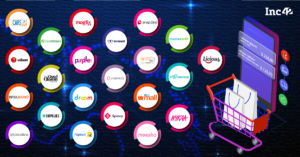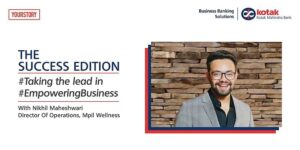The Fabricant founders. Left to right, Amber Slooten, Kerry Murphy and Adriana Hoopenbrouwer. (Image credit: The Fabricant)
One of the eternal struggles of startups and scaleups is: how to get properly funded? While Amsterdam’s ecosystem offers many ways to find funding, every startup chooses its own path toward that landmark. Every month we talk to a founder on their quest for investment. First off is Adriana Hoppenbrouwer, co-founder and CCO of Amsterdam’s fashion house for the metaverse The Fabricant, on their journey towards Series A.
What is The Fabricant?
The Amsterdam based startup The Fabricant was founded in 2018 by Kerry Murphy, Amber Slooten and Adriana Hoppenbrouwer. It is best described as a digital fashion house for Web3. Since its inception, it has created quite a buzz, operating on the convergence of global fashion and Web3. Their latest product is Fabricant Studio. The currently invite-only online platform aims to democratise the world of fashion design by allowing anyone to customise, own and sell digital fashion items.
Has the Dutch workforce mastered all digital skills? Find out
“We’re building the largest wardrobe for the metaverse”, says The Fabricant co-founder Adriana Hoppenbrouwer. “There are enough naked or badly dressed avatars out there.” The Fabricant’s studio will get those digital individuals the most fabulous outfits, but not with the usual designers. Instead, anyone can join, design and sell. Web3 promises that anyone is also fairly compensated.
Hoppenbrouwer explains it with an example: “Imagine you take a picture of a restaurant and you share it with 1000 people. You’re the photographer, the content creator, but Instagram gets paid. In web3, you get paid.” In The Fabricant Studio, users can currently customise items from selected brands or designers. “If you customise, then you own it. If you sell it, the royalty splits equally. As the enabling platform, we take 10 per cent of primary transactions and 5 per cent of secondary transactions.”
How did they get to this product?
Hoppenbrouwer says the company started as an agency, guiding fashion moguls through the web of new technologies. “In 2018, the world didn’t quite understand the blockchain. The fashion world faced it with scepticism. We operated as an agency for brands to use that technology in marketing and communication. A niche boutique agency for web3 fashion.”
Being an agency was never the goal, though. “We always wanted to create a software product where everyone could use digital fashion. In 2019 we launched the first digital dress NFT ever. We saw interest in the arena of creating a more immersive connection with fashion.”
According to Hoopenbrouwer, their initial agency helped The Fabricant to establish a connection with traditional fashion players. At the same time, their fashion NFTs enabled them to understand the dynamics of that new market. That allowed them to launch their current platform: Fabricant Studio.
How much are they raising?
Well, they already closed their round. You might’ve seen the news. Two weeks ago, The Fabricant announced raising €12.8 million, with Berlin-based Web3 fund Greenfield One as the lead investor. Notable is the long list of other investors joining the round. Sound Ventures may ring a bell, the investment fund headed by Ashton Kutcher and Guy Oseary. And the list includes many names of highly regarded crypto-investors and earlier VCs that participated in the seed funding round back in 2020.
So how did they do it?
Hoppenbrouwer: “With the launch of our product, we were ready to approach potential Series A investors. We had a product, and we had a community. And the market was in a different understanding of Web3 and NFTs. So that made it a lot easier.”
At the time of raising, The Fabricant had no CFO. “We do now”, adds Hoppenbrouwer. But that meant the brunt of the work fell on her and co-founder Kerry Murphy’s shoulders. “But I love talking about the product, and it is good to meet so many incredibly smart people. You get a lot of difficult questions.”
>> Read also: Experts on what to expect from Amsterdam startup ecosystem in 2022?
Hoppenbrouwer doesn’t look back at the process of raising funding as incredibly difficult because someone else did some of their work for them. Mark Zuckerberg launched his metaverse and detailed his plans for Web3 to a global audience. Understanding Web3, or at least the basics, was a requirement from that moment on.
“That made it a lot easier for us”, says Hoppenbrouwer. “Although it’s a double feeling. Meta’s metaverse is good for recognition, and it helped us create awareness. But the ethos of web3 is decentralisation. Facebook is still a centralised entity, where creators make no money.”
What’s next for The Fabricant?
“Now it is all about scaling up”, says Hoppenbrouwer. Their platform will be invite-only until next year, so they can keep growing their community from the ground up. Hoppenbrouwer: “We are creating a new fashion industry. In 2018 we felt like we had to lead the way. Now that we are an enabler, we can also create change. The ecosystem is bigger than us.
“A decentralised and immersive web will impact many businesses. We want everyone to have the same equity in the entire system.” As for the fashion industry, Hoppenbrouwer is eager to see how they transition to the inevitable reality of Web3. “How will brands act when the community members are co-owners, with their own extensive rights? I hope this piece of the puzzle stays intact. That the ethos of decentralisation will not be forgotten.”
Catch our interview with Paul Down, Head of Sales at Intigriti.









